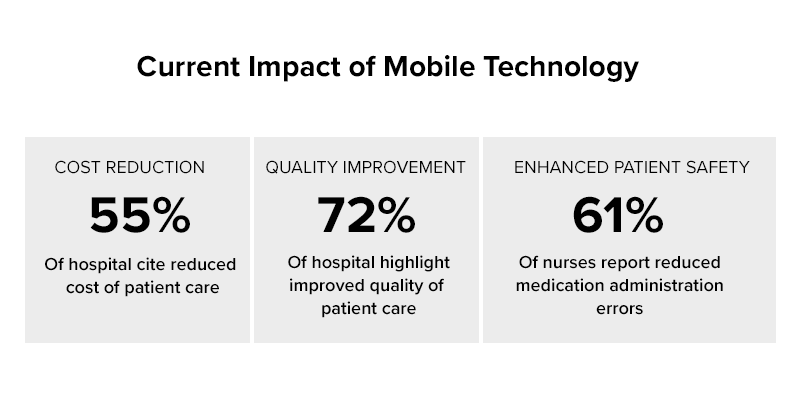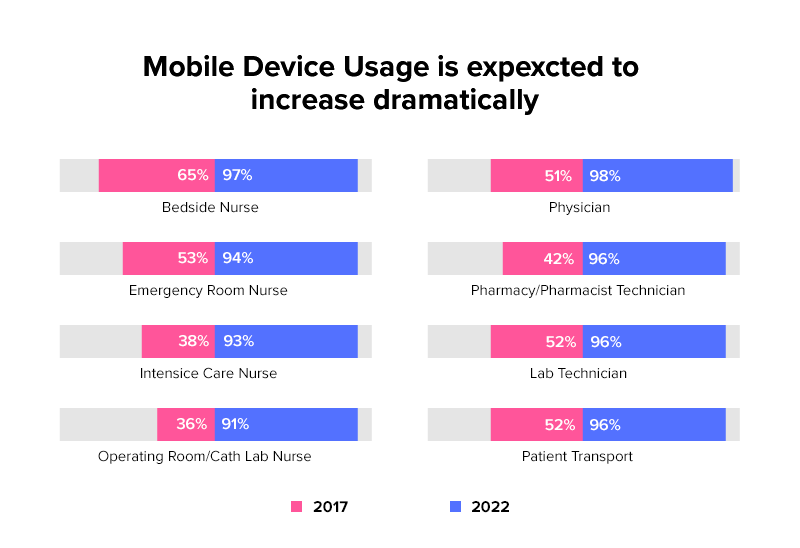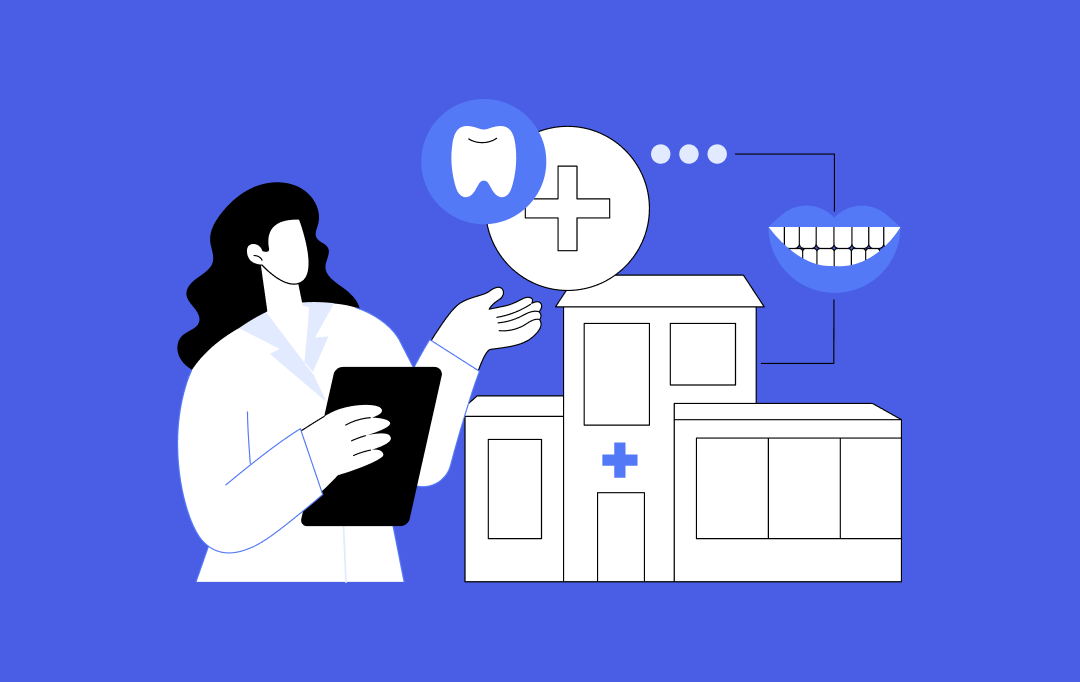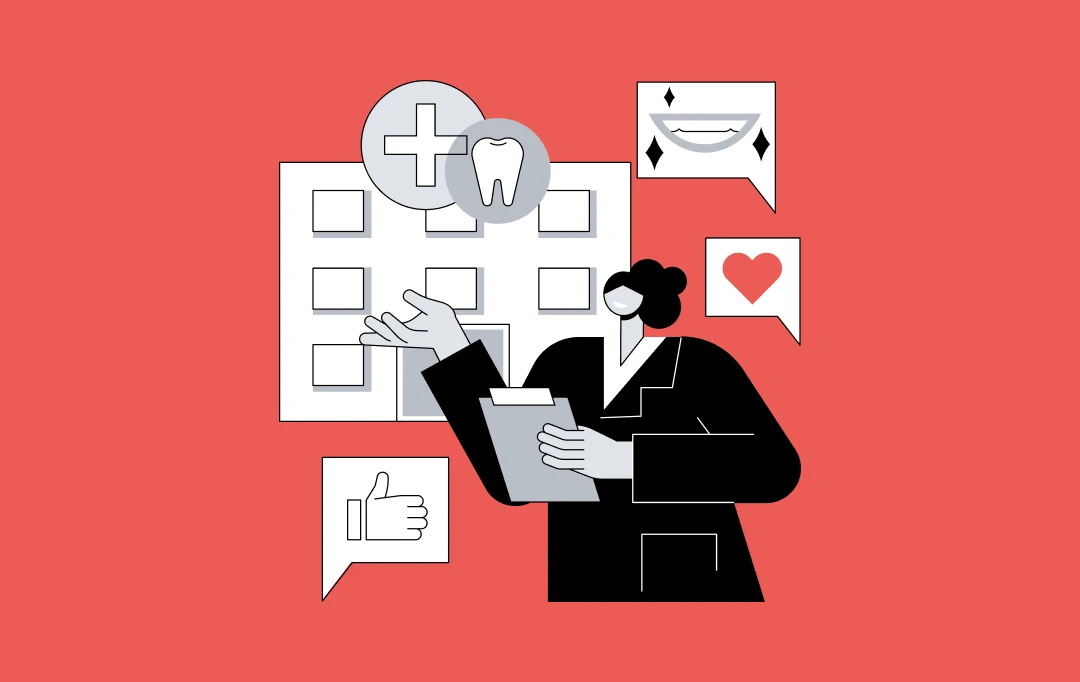- What is Clinical Mobility?
- 5 Reasons Why Every Hospital Should Have a Clinical Mobility Solution
- 1. Real-time access to the medical records
- 2. Efficient clinical communication
- 3. Lower operation costs
- 4. Strong patient data security
- 5. Centralized device management
- How to Build Effective Enterprise Mobility For the Healthcare Industry?
- 1. Think of the growing mobile usage in healthcare setup
- 2. Manage ownership of clinical mobility solutions
- 3. Address healthcare industry compliances and policies
- 4. Have a patient-centric mobility solution
- 5. Align the solution with the existing healthcare system
Constantly delivering cost-effective and safe patient care while ensuring smooth operations is a challenging task for the entire healthcare domain. However, even amidst the challenges, the task is a prerequisite for the success of healthcare organizations.
In a typical healthcare setup, decision-making is time-sensitive, and in a number of instances, the clinicians do not have enough data pertaining to patient health and clinical decisions to make informed decisions in real-time.
Accepting the critical role of information in patient care delivery and hospital management, healthcare organizations have doubled down their efforts behind the creation of clinical mobility solutions. They are constantly investing in clinical mobility technology to better the immediacy, accuracy, and accessibility of patients’ health information.
Strategized investments in the Internet of Things, Electronic Health Records, smart devices, Artificial Intelligence, etc. are not just empowering clinicians but also bettering the patient care quality. However, in spite of such impressive mobility in healthcare continues to face operational and adoption barriers.
In this article, we will be deep diving into what can be done to improve the chance of the mobility program in healthcare success. Instead of getting straight down to the basics, we will be noting the many benefits of hospital mobility programs, to help the organizations which are still on the fence join the healthcare mobility trends and avail the many benefits that healthcare digitalization has to offer.
What is Clinical Mobility?
Clinical mobility solutions for healthcare revolves around using mobile devices like tablets, handheld mobile computers, and mobile printers, etc. for positively transforming patients’ care delivery inside a hospital.
By integrating and combining new-gen technologies like the Internet of Things, Artificial Intelligence, clinical mobility in healthcare industry is ushering a new era in the healthcare sector – one that is dominated by high quality, low delivery cost, and greater patient care centricity.
To meet the needs of clinical mobility solutions, as we will read in the next section, the new-age healthcare mobility solutions are coming loaded with three application categories: workflow management, data management, and collaboration & communication.
- Workflow management – biomedical device alarms, work rule routing, EMR text notifications, nurse call alerts, and employee locationing.
- Data management – data capture and data retrieval in real-time.
- Communication and collaboration – secure text messaging, telemedicine, VoIP, digital image capture.
5 Reasons Why Every Hospital Should Have a Clinical Mobility Solution
There are a number of reasons which chart the need for creating a strategy for a healthcare mobility solution. Some of the top ones in the list include:
1. Real-time access to the medical records
Enterprise mobility in healthcare revolutionizes the way healthcare providers access patient records. The devices and EHR-centric solutions enable them to gather real-time access to the patient data without waiting on the administrative team to provide them the details.
With readily available access to the patients’ data, medical professionals are able to take a quicker and effective clinical decision and at the same time, the patient wait time lowers to a great extent. In all, enterprise mobility in healthcare helps not just the patients but the healthcare unit as a whole.
2. Efficient clinical communication
By bringing medical data on mobile devices in text and voice format can help clinical staff communicate and coordinate in real-time, thus helping address patients’ needs in an effective and timely fashion.
Additionally, the mobile devices also enable pairing with healthcare wearables and other smart medical devices, thus making it possible for the clinicians to take a comprehensive decision.
3. Lower operation costs
By lowering the need for individual devices and replacing them with an all-encompassing enterprise mobility solution in healthcare, organizations get to save a significant amount of money. The upfront costs transform into long-term savings in terms of lower dependency on device hardware, IT support needs, and efficient staff management.
Healthcare organizations can save further by placing healthcare-grade rugged devices in place which are designed for durability and lower repair and servicing costs.

4. Strong patient data security
Accessing patients’ real-time data is one thing but ensuring that the data is 100% hack-proof is an altogether different ball game. Mobile technologies give healthcare organizations complete control over their patients’ data with easy-to-use device management tools.
Lately, the industry is also exploring ways to introduce blockchain into the healthcare domain to ensure that the patient data is anonymous and breach-proof.
5. Centralized device management
The wireless connectivity nature of clinical mobility devices aid remote and centralized device management. The healthcare app developers generally create a system wherein the hospital or clinic’s IT staff can access and monitor healthcare mobility equipment’s status, network connections, performance, and usage in real-time and then send in the notification if an when a problem arises.
The reasons highlighting the need for digitalized clinical mobility solutions are in abundance. But sadly, so are their failure rates. Here’s a 2017 video noting the challenges faced by the health care leaders which keep the healthcare improvement efforts from reaching their full potential –
Although three years have passed since then, the issues remain constant. In such a situation where the challenges are poised to bring down the adoption rate, it becomes a challenging task for a healthcare organization to deploy a healthcare mobility strategy that will stick.
To make the job a little easier, let us look into the factors that every healthcare mobile app development company suggests to better the clinical mobility solutions’ adoption rate while bettering the efficiency of the overall healthcare organization.
How to Build Effective Enterprise Mobility For the Healthcare Industry?
The role of mhealth applications in healthcare evolution has been established as pivotal several times. What is less discussed is how to make a healthcare solution that is designed for success and high adoption.
1. Think of the growing mobile usage in healthcare setup

The success of a clinical mobility solution should start with identifying the foundational devices that administrators and clinicians use: tablets, smartphones, and laptops. Once it is established, they should move to the part where they look into fitting in the information and tools that the hospital staff needs to offer effective care to the patients and streamline the operational tasks.
The mobility solutions must be designed to become the first point of contact whenever the clinicians require any patient data. Moreover, the scope of new-gen technology integration like IoT, AI, or Blockchain should be given a greater focus in the ideation phase of healthcare app development services.
2. Manage ownership of clinical mobility solutions
One of the crucial decisions that every healthcare organization has to take when it comes to the incorporation of a clinical mobility solution, is who will be responsible for the ownership of the system. Will the doctors who are interacting with the patients hold the responsibility of modifying the data or should it be done by the billing team?
What we recommend is giving the stakeholders modification access in the system but the department head or the app admin should have the approval or decline modification power. That is if you want to have a centralized system in place. Otherwise, the best solution when it comes to handling sensitive data is keeping the information on a decentralized system that is hack-proof.
3. Address healthcare industry compliances and policies
The healthcare industry is powered by several compliances and rules. Revolving around several domains, the crux of all the healthcare compliance is more or less the same – ensuring that the users’ data is protected. While your partnered healthcare app development company can help with the creation of solutions that follow the intricacies of the global healthcare compliances, it is also important to relook at the system backend with the same compliance-check point of view.
Only when you are able to create a compliance-meeting solution and process you will be able to invite healthcare organizations to incorporate them into their internal processes.
4. Have a patient-centric mobility solution
Even though the clinical mobility solution that we have discussed at length in this article is one that will be used by the clinicians or medical professionals, the outcome should be patient favoring.
They should be designed to keep the patient wait time minimal, the discharge process hassle-free, and the insurance claim, bills clearance steps real-time & under three clicks. Additionally, the solution should be one that supports remote care through the adoption of video conferencing, wearables’ integration, etc.
5. Align the solution with the existing healthcare system
Before you start working on a mobility solution, ask your healthcare application development company to look into the infrastructure and system configurations commonly present in the hospitals and clinics in your area of operation.
Irrespective of how well-designed and deployed your clinical mobility solution is if it fails to connect with the systems present in the healthcare organizations, the problems in terms of high operational cost and low adoption rate will only worsen. Thus, it is very important to partner with an agency that specializes in the modernization of a legacy system.
The success formula of all the strategies and design, development approach followed for the creation of an efficient clinical mobility solution ultimately comes down to its ability to make healthcare operations real-time and patient-centric.
In case this seems a lot to digest, get in touch with our healthcare mobility team to convert this information into a digitalized solution for your healthcare organization.



How Much Does it Cost to Build a Custom Dental Practice Management Software?
In recent years, dental practices have shifted away from manual, paper-based systems and embraced advanced software solutions. This change boosts efficiency, enhances patient experiences, and improves data management. While dealing with patient data, dentistry has ditched old-school methods like physical charts, appointment books, and manual billing. They’ve leveled up with a high-tech data handling &…

EMR Integration in Healthcare Systems - Benefits, Features, Process, Costs
EMR integration, having proved its worth in the healthcare space with improved workflows, better patient engagements, and lowered operational costs has built itself a projected market share of USD 20.7 billion. Eventhough a range of hospitals swear upon the benefits EMR system integration has garnered them, the adoption level digital healthcare industry anticipated has still…









